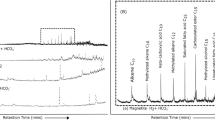Abstract
Our ideas of the possible composition of the atmosphere of the primitive Earth have broadened markedly since Oparin's1 and Urey's2 postulates of a highly reducing atmosphere containing hydrogen, ammonia, hydrocarbons and water. Since then, various geochemical models of the primordial atmosphere have been proposed3–6. Of importance is whether abiological organic compounds can be formed from the interactions of energy sources with nitrogen, oxidized carbon and water. Experiments involving electrical discharge5,7 and bombardment with beams of He ions6 of various mixtures of CO, CO2, N2, H2 and H2O suggested that formic acid was the major organic product. We now report experiments using quenched spark discharges through molecular nitrogen on aqueous suspensions of CaCO3 and other reactants to simulate the atmosphere/hydrosphere interface. Hydrazine and carbohydrazide are recovered in significant but low yields. Their reactions in primitive aquatic environments could have supplied a pathway for chemical evolution and the origin of life on a primitive Earth in which carbon in the fully oxidized states was available for the primary synthesis of organic matter.
This is a preview of subscription content, access via your institution
Access options
Subscribe to this journal
Receive 51 print issues and online access
$199.00 per year
only $3.90 per issue
Buy this article
- Purchase on Springer Link
- Instant access to full article PDF
Prices may be subject to local taxes which are calculated during checkout
Similar content being viewed by others
References
Oparin, A. I. The Origin of Life (Macmillan, London, 1936).
Urey, H. C. The Planets (Yale University Press, New Haven 1952).
Rubey, W. W. Geol. Soc. Am. Spec. Pap. 62, 631 (1955).
Cloud, P. E. Jr, Science 160, 729 (1968).
Abelson, P. H. Proc. natn. Acad. Sci. U.S.A. 55, 1365 (1966).
Walker, J. C. G. Evolution of the Atmosphere (MacMillan, New York, 1977).
Garrison, W. M., Morrison, D. C., Hamilton, J. G., Benson, A. A. & Calvin, M. Science 114, 416 (1951).
Schiessel, H. W. Aldrichimica Acta 13, 33 (1980).
Siollé, R. & Hoffman, K. Chem. Ber. 37, 4523 (1904).
Fichter, F. & Becker, B. Chem. Ber. 44, 3481 (1911).
Furst, A., Berto, R. C. & Hooton, S. Chem. Rev. 65, 51 (1965).
Bordun, M., O'Connor, J. M., Padmanabhan, G. R. & Mollica, J. A. Analyt. Chem. 49, 161 (1977).
Kurzer, F. & Wilkinson, M. Chem. Rev. 70, 111 (1970).
Park, W. K., Hochstim, A. R. & Ponnamperuma, C. Origins of Life 6, 99 (1975).
Strickland, J. D. & Parsons, T. R. A Practical Handbook of Seawater Analysis (Bull. 167, Fisheries Research Board of Canada, 1968).
Author information
Authors and Affiliations
Rights and permissions
About this article
Cite this article
Folsome, C., Brittain, A., Smith, A. et al. Hydrazines and carbohydrazides produced from oxidized carbon in Earth's primitive environment. Nature 294, 64–65 (1981). https://doi.org/10.1038/294064a0
Received:
Accepted:
Issue Date:
DOI: https://doi.org/10.1038/294064a0
This article is cited by
-
The Emergence of Life
Space Science Reviews (2019)
-
A Reassessment of Prebiotic Organic Synthesis in Neutral Planetary Atmospheres
Origins of Life and Evolution of Biospheres (2008)
-
The evolution of nitrogen cycling
Origins of life and evolution of the biosphere (1988)
-
A possible energetic role of mineral surfaces in chemical evolution
Origins of life and evolution of the biosphere (1985)
-
Prebiotic synthesis in atmospheres containing CH4, CO, and CO2
Journal of Molecular Evolution (1983)
Comments
By submitting a comment you agree to abide by our Terms and Community Guidelines. If you find something abusive or that does not comply with our terms or guidelines please flag it as inappropriate.



